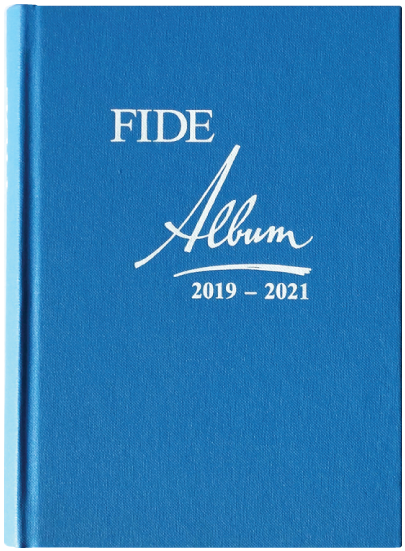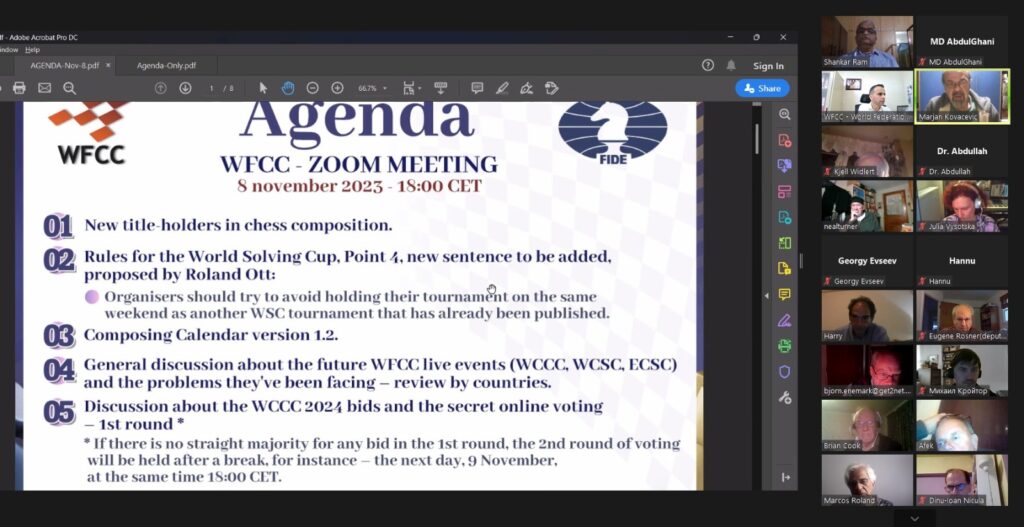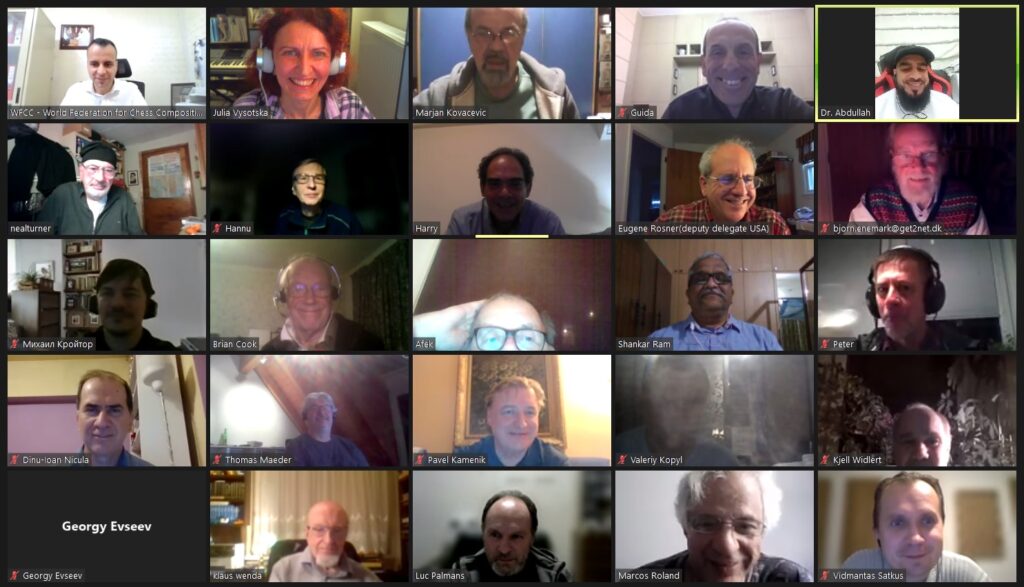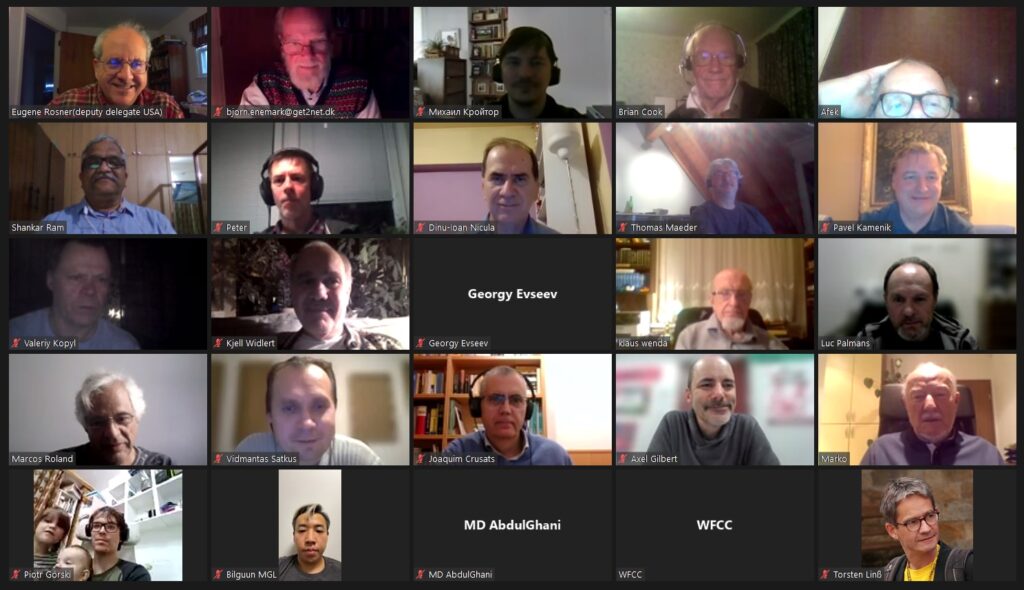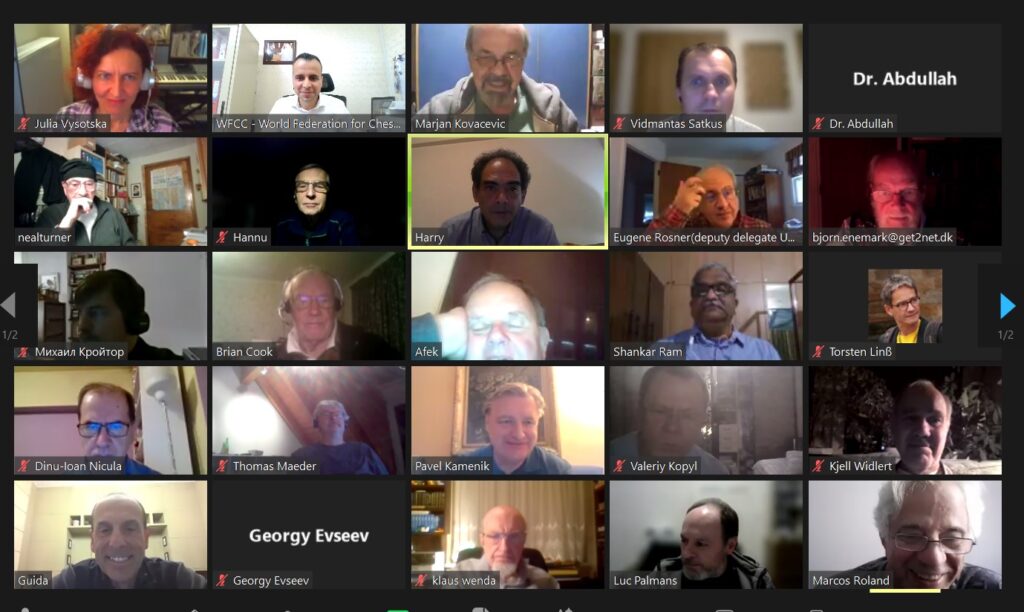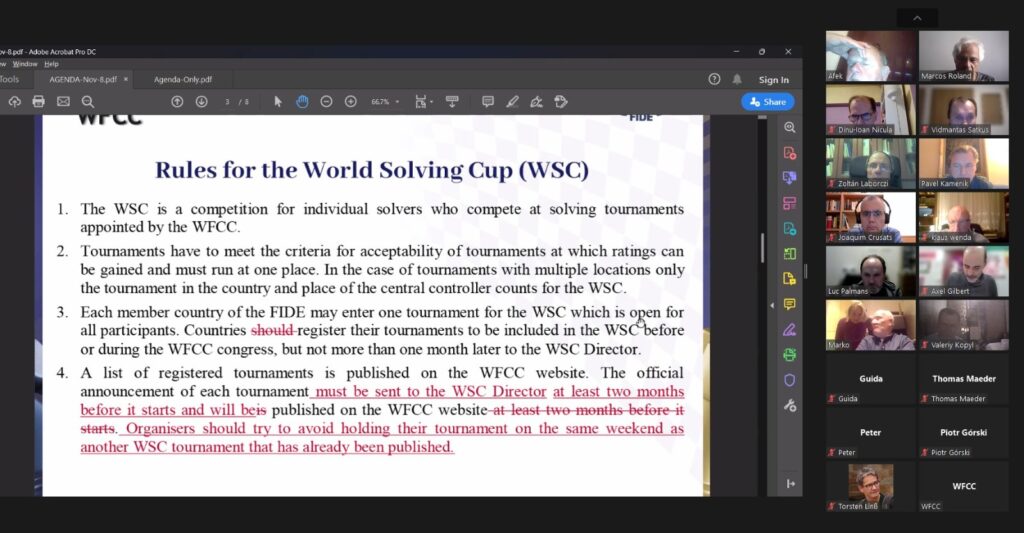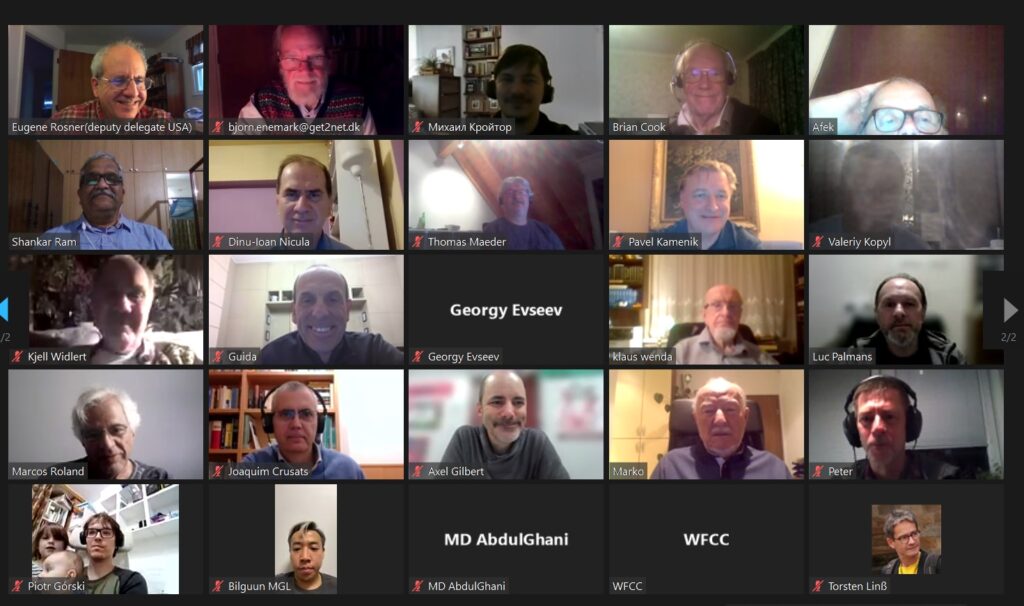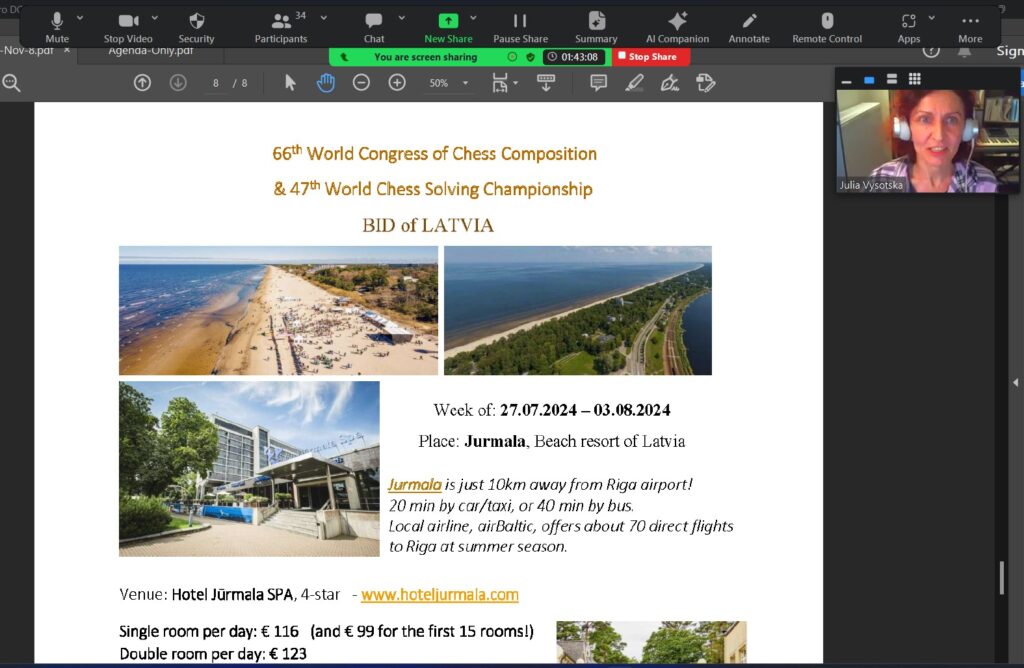The new FIDE Album 2019-2021 (an official selection of the world’s best and most representative chess compositions) has been published. 832 pages, 1840 diagrams, 298 authors, 1.6 kg. Comments, indexes, registers, statistics in English.
Hard-cover blue clothbound. Price 56 euro. Orders preferably at fidealbum.com (or by email to peter.gvozdjak@gmail.com). Sample pages available as a PDF file there.
Category: FIDE Albums
FIDE Album 2022-2024 announcement
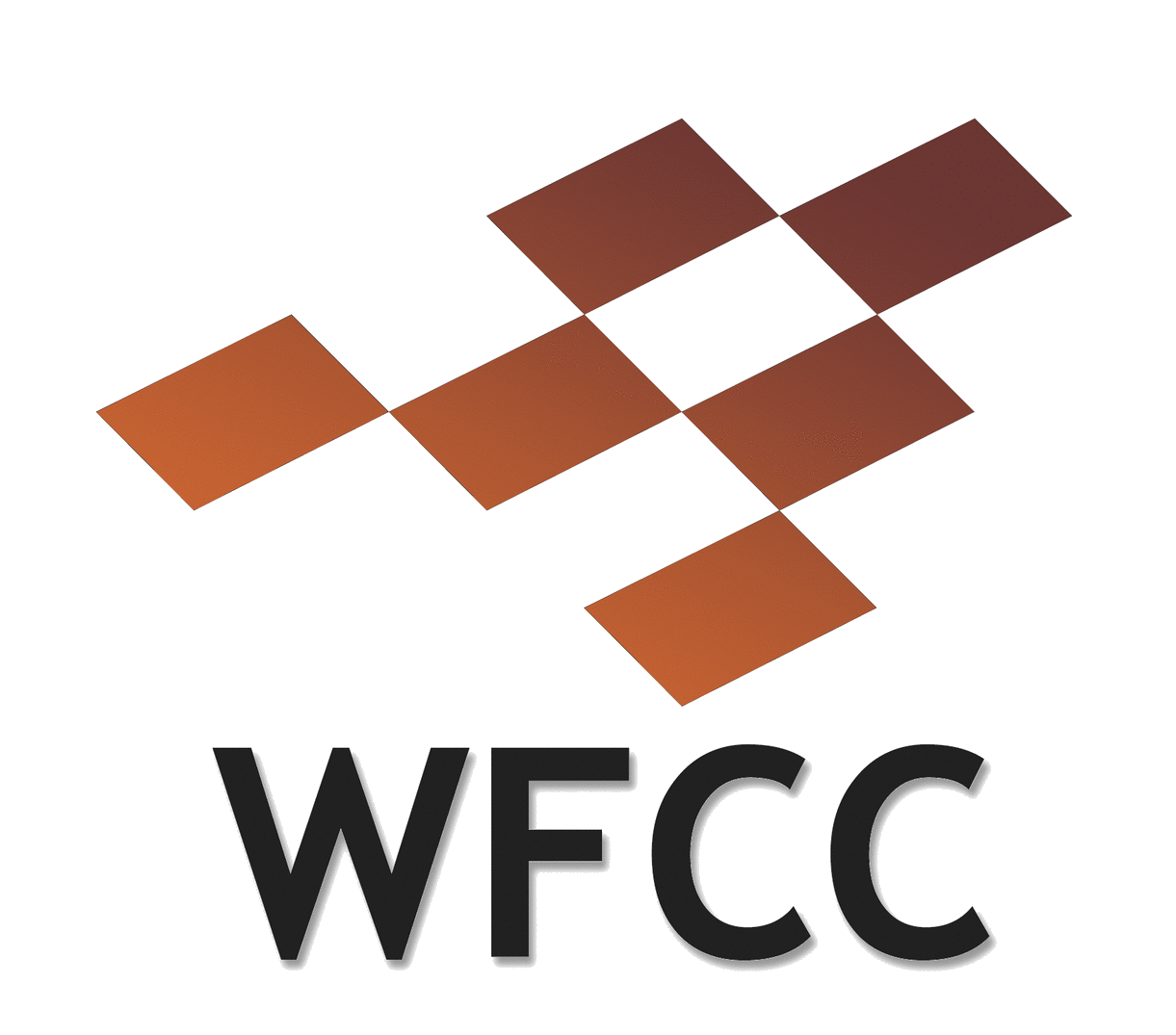
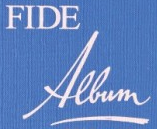
The World Federation for Chess Composition (WFCC) invites composers to submit their highest-quality compositions for selection in the 2022-24 FIDE Album.
See the announcement and the instructions to directors and judges.
Jurmala will host 66th WCCC and 47th WCSC (27.07 – 03.08.2024)
WFCC online Meeting, 8th November 2023
30 Member Countries took part in the WFCC online Meeting that was mostly devoted to discussion about the future WFCC events and the host of the 66th WCCC and 47th WCSC 2024.
At the beginning, the FIDE Album Committee spokesman Harry Fougiaxis announced the new title-holders in chess composition:
- Grandmaster: Steffen Slumstrup Nielsen (DEN)
- International Master: Karen Sumbatyan (RUS)
- FIDE Masters: Sergiy Didukh (UKR), Daniel Keith (FRA), Jan Sprenger (GER), Aleksandr Stavrietsky (RUS)
Congratulations!!
These norms were fulfilled according to the results of the Section D (endgames) of the FIDE Album 2019-2021, published on 4th November.
→read more: WSC rules and discussion by country…This long-lasting session was interrupted after speeches of some other delegates, to execute secret voting while all participants were still present. Out of 30 delegates in the Zoom Meeting 21 gave vote to Jurmala, four to Rhodes and three to Rio de Janeiro. One delegate didn’t vote and one was abstained. After adding two more votes sent by email, Jurmala convincingly won straight majority with 23 votes from 32 delegates.
With such a wide support, we will be preparing for a memorable Congress in Latvia, from 27th July to 3rd August 2024!
After the voting some delegates had to leave, while others continued the review by countries.
→read more: discussion by country…This Zoom Meeting was excellently organized by the secretary Mohammad Alhallak. He also replaced the UAE delegate Abdulla Ali Aal Barket in presenting optimistic plans about development of solving in the UAE, in neighboring countries and in the whole Asia.
Marjan Kovačević, WFCC president
FIDE Album 2019-21 Section D results

The results of the FIDE Album 2019-21 section D are ready!
A reasonably high number of 1015 studies (not counting 13 duplicates) were received. 873 compositions scored at least 4,5 points (86% of the total entries, a very good percentage). 179 studies out of them scored at least 8 points, which represents a good ratio of 20,5% selected compositions. It is a great pity that we present the results with such delay: one of the appointed judges failed repeatedly to meet the schedule requirements, so at the end of September it was decided that another judge should complete the rest of the work (1/3 of the entries). Our compliments to the substitute judge: he managed to finish his part in slightly less than a month!
Many thanks to the director and the judges for their hard and efficient work!
We shall update and issue the overall list of the title points in the coming days.
Update (6.11.2023): A few hours after the results were announced, the director realised that he had accidentally misplaced the PDF file submitted by a composer. The judges reviewed these 8 studies swiftly: 2 of them (joint compositions) are selected in the album! Numbers in the above post and in the page of the results have been properly updated.
Harry Fougiaxis, FIDE Album Committee spokesman
Current list of composing title points 24.08.2023

We decided to release the latest version of the composing title points list even if the studies section is not finished yet. Points from the album fairies section have been added and the recent small changes in the helpmates section have been included. A lot of information has been also integrated from the Chess composers’ names in various alphabets database and the current lists of titles in the site: country names, dates of birth/death, title, year the title was granted, name in native form (the latter piece of information is available only in the Excel spreadsheet itself). The migration/integration was done by Bjørn Enemark and checked by Harry Fougiaxis in just two weeks; we trust we have compiled all the information properly, but please let us know in case you have found some mistake!
Harry Fougiaxis, FIDE Album Committee spokesman
FIDE Album 2019-21 Section G results

The results of the FIDE Album 2019-21 section G are ready!
A high number of 1479 fairies (not counting 19 duplicates) were received and, as in the previous album, they were split in two groups: G1 for problems without fairy conditions (729) and G2 for those with fairy conditions (750). In each group there were three judges with each team of judges working independently. 1274 entries scored at least 4,5 points (86,14% of the total entries, a very good percentage). 383 compositions out of them scored at least 8 points, which represents a high ratio of 30% selected problems. Of course the respective ratio varies in the two groups. Full statistics are given in the page of the results.
Many thanks to the director and the judges for their hard and efficient work!
Harry Fougiaxis, FIDE Album Committee spokesman
Current list of composing points 31.07.2023

We updated the list of WFCC composing points in line with the results of the FIDE Album 2019-21 six finalized sections. The next issue is scheduled after the results of studies and fairies are known. Congratulations to the new title holders! Distribution of the diplomas will take place in the Batumi congress.
Harry Fougiaxis, FIDE Album Committee spokesman
FIDE Album 2019-21 Section E results

The results of the FIDE Album 2019-21 section E are ready!
An impressive number of 2380 helpmates (not counting 67 duplicates, withdrawn, unpublished problems) were received and they were split in three groups: E1 for h#<=2, E2 for h#2,5 and h#3, and E3 for h#>3. As usual, the h#2s dominated once more. In each group there were three judges with each team of judges working independently. 2053 entries scored at least 4,5 points (86,3% of the total entries, a very good ratio for such a popular genre). 362 compositions out of them (nearly 10% less compared to the previous album) scored at least 8 points, which represents a reasonable ratio of 17,9% selected problems (same percentage as in the previous album!). Of course the respective ratio varies in the three groups. Full statistics are given in the page of the results.
Many thanks to the director and the judges for their hard and efficient work!
Update (20.08.2023): Five h#2s were downgraded by the judges due to poor originality (Krätschmer/Wiehagen, Jorge Karpos, Novomeský, Vasyuchko) or weak economy (Mosiashvili). The compositions were removed from the list and the results were updated.
Harry Fougiaxis, FIDE Album Committee spokesman
FIDE Album 2019-21 Section A results

The results of the FIDE Album 2019-21 section A are ready!
1029 twomovers scored at least 4,5 points (out of the totally submitted 1250 entries), a very good percentage of 82,3%. Out of this lot, 233 compositions are selected with 8+ points (including 41 qualifying from WCCI), a reasonable percentage of 22,6%.
Many thanks to the director and the judges for their hard and efficient work!
Harry Fougiaxis, FIDE Album Committee spokesman
FIDE Album 2019-21 Section F results

The results of the FIDE Album 2019-21 section F are ready!
962 selfmates scored at least 4,5 points (out of the totally submitted 994 entries), a pleasantly very high percentage of 96,8%. Out of this lot, 270 compositions are selected with 8+ points (including 65 qualifying from WCCI), a high percentage of 28,1%. The recent development and quality increase of selfmates is evident: 55 more compositions are selected compared to the previous album.
Many thanks to the director and the judges for their hard and efficient work!
Harry Fougiaxis, FIDE Album Committee spokesman






